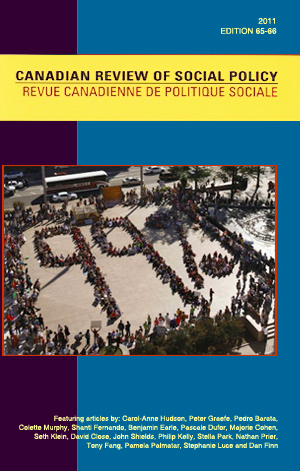Anti-Poverty Policies and the Adoption of Bill 112 in Quebec: A Change of Path?
Résumé
In this paper, we address anti-poverty policies in Quebec and especially the adoption of Bill 112 in December 2002. We argue that apart from structural elements specific to the Quebec context, without the popular mobilisation initiated by the Collectif pour une loi sur l'élimination de la pauvreté, Bill 112 would not have been developed or passed into law. We show first how social actors have created a movement that changed the conditions of public action towards poverty, analysing the particular political opportunity structure of the time period (1995-2002) favourable to the Collectif and two internal dimensions of the movement: its efficient strategy, and the fact that poor people themselves were at the forefront of the mobilisation. We then argue that these changes are not equivalent for all poor persons in terms of material gains. We finish by suggesting that the most important change is cognitive. All in all, Bill 112 should be seen as an exception in the political treatment of poverty; but a moment that has only slightly changed the rules of the game and the possibilities for future state actions. Dans cet article, nous traitons des politiques anti-pauvreté au Québec et spécialement de l'adoption de la Loi 112 en décembre 2002. Nous soutenons que mis à part des éléments structurels spécifiques au contexte québécois, sans la mobilisation populaire initiée par le Collectif pour une loi sur l'élimination de la pauvreté, la Loi 112 n'aurait pas été proposée ou adoptée. Nous montrons, dans un premier temps, comment les acteurs sociaux ont créé un mouvement qui a changé les conditions de l'action publique envers la pauvreté, en analysant la structure d'opportunité politique de la période (1995-2002) favorable au Collectif ainsi que deux dimensions internes du mouvement: sa stratégie efficace et le fait que les personnes pauvres elles-mêmes étaient à l'avant-plan des mobilisations. Nous soutenons, ensuite, que ces changements ne sont pas identiques pour toutes les personnes pauvres, en termes de gains matériels et nous terminons en suggérant que le changement le plus important est surtout cognitif. Tout bien considéré, la Loi 112 doit être vu comme un moment d'exception dans le traitement politique de la pauvreté; mais un moment qui changé les règles du jeu (même marginalement) et les possibilités de l'action publique future.Publié-e
Comment citer
Numéro
Rubrique
Licence
1-The author guarantees that the manuscript is an original work not published elsewhere in print or electronically in whole or in part, except in abstract form, that the author has the full power to make this contribution, and that the manuscript contains no matter libelous or otherwise unlawful or which invades the right of privacy or which infringes any proprietary right.
2-The author guarantees that the manuscript has not been previously published in print or electronically and that if the manuscript contains any tables, figures or images fully reproduced or closely adapted from previously published material, the author must obtain the necessary permission from the author/publisher holding the original copyright prior to publication in CRSP. The author may be required to produce evidence of permission granted to CRSP’s editors.
3-As a condition of publication in CRSP, the author assigns all copyright to CRSP, including but not limited to the right to publish, republish, and otherwise distribute this manuscript in print, electronic, or other formats. As CRSP is a non-profit interdisciplinary scholarly journal, the author will receive no royalty or other monetary compensation for the assignment set forth in this agreement.
For the purpose of full disclosure, CRSP will not normally use the content provided by the author in a commercial venture, but for the purpose of disseminating the author’s content to as many readers as possible. For distribution, third parties engaging in commercial activities may be contracted to distribute the content globally, and such parties may make a profit out of the author’s content in their normal course of business. CRSP will not pay the author or reimburse the author in any form based on such commercial activities because the conduct of such commercial activities is outside the control of CRSP.
Any future reference to or use of this published material by the authors must acknowledge CRSP as the original place of publication.
PERMISSION REQUEST/ARCHIVING
Permission is given to author(s) receiving funding via Tri-Council Agencies, the Canadian Institutes of Health Research (CIHR), the Natural Sciences and Engineering Research Council of Canada (NSERC) and the Social Sciences and Humanities Research Council (SSHRC), to make their publications freely available in an Open Access repository within the stated deadline by the Tri-Council Agencies (12 months following publication). Archiving of publication must be a manuscript copy bearing none of the CRSP headers, footers or any other distinguishing marks. No links to the article on the CRSP website is permitted.
Permission requests from third parties to reproduce articles in part or full in academic/educational publications can be directed to the managing editor of CRSP, and will not be unreasonably denied.

